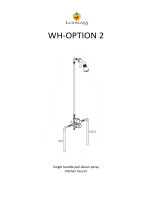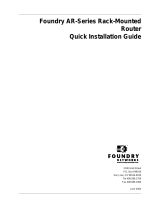Page is loading ...

Quick Eagle’s 5840 Multiport Router
TM
is ideal for medium-sized businesses and
enterprise branch offices that need routers that can scale as the network
requirements grow without having to add more hardware.
With its high port density, the 5840 Multiport Router delivers all the functions you
need in a branch office router: The ability to configure static routes, and one or
more dynamic routing protocols like RIP1, RIP2, OSPF, and optional BGP-4,
enables the router to link enterprise networks with advanced IP routing services,
such as multipaths and path redundancy.
Static NAT, dynamic NAT, and overloading (NAPT) lets you access the Internet
using your private IP addresses. A stateful inspection firewall permits or denies
access based on source and destination IP addresses. The embedded network
performance monitoring features enable protocols and applications monitoring
(RMON-1, RMON-2) and Frame Relay Service Level Verification.
In addition to its wealth of standard features, the 5840’s unique architecture
provides the flexibility to meet the most demanding and evolving business
requirements: Enabling your network to grow with your business, the 5840
Multiport Router can be upgraded for added bandwidth (up to 12 Mbps with 8 T1
or 16 Mbps with 8 E1 WAN ports) through software. No waiting for hardware, no
engineering time to perform the upgrade, and no lengthy system downtime is
required.
Multilink PPP (RFC1990) and Multilink Frame Relay (FRF.16.1) protocols
provide the 5840 Multiport Router with the capability to bond multiple T1/E1s
into a single high-speed virtual link or enable load balancing applications. The
5840 Multiport Router can also be deployed as a MAC Learning Bridge (IEEE
802.1d) over Frame Relay or PPP.
With its optional standard-based DiffServ QoS (Differentiated Services/Quality Of
Service) capability the 5840 Multiport Router allows you to control and manage the
bandwidth on your WAN connection, eliminating bottlenecks for your business-
critical applications such as ERP and CRM. In addition, DiffServ QoS enables
delay-sensitive voice and video-over-IP services, while dedicating enough
bandwidth for lower priority traffic.
With its excellent performance, scalability in routing protocols, breadth of
features, and competitive pricing
1
, there is now an alternative to those
traditional, high cost, proprietary branch office routers.
When port density counts.
Main Benefits:
• Uses software feature keys to
scale WAN port configuration
without the need for expensive
hardware upgrades
• Improves network reliability and
performance through load sharing
and load balancing in a
multihoming environment
• Offers flexible interfaces that can
be deployed as independent links
or bundled into one or more
MLPPP or MLFR bundles
• Supports broad range of routing
protocols such as static routing,
RIP1, RIP2, OSPF, optional
BGP-4, IGMPv3, and GRE
•
Reduces access cost by
integrating NAT services for
Internet access
• Better performance than many
traditional branch office routers
due to integrated hardware and
software architecture
• Lowers cost of ownership through
integrated routing, CSU/DSU,
optional Quality of Service, and
network monitoring capabilities
The 5840 Multiport Router
1
Please refer to Quick Eagle’s 5842 and 5844 Multiport Routers if you require a lower port density router with an even lower cost.

The 5840 Multiport Router provides the following features:
• Support for a wide variety of WAN protocols such as PPP, Frame Relay, Multilink PPP,
Multilink Frame Relay FRF.16.1, and MAC Learning Bridging for point-to-point and point-
to-multipoint applications to the Internet, private or public Frame Relay networks
• Advanced IP / Frame Relay Router capabilities with:
• Standard-based IP-over-Frame Relay encapsulation, RFC-2427 compliant
• Link Management Interface (LMI): ANSI AnnexD, ITU Annex A, and FRF Rev 1.0
• Static and dynamic configuration of up to 1024 DLCIs
• Static and dynamic mapping of DLCI to IP Subnets using InverseARP
• Dynamic routing protocols RIP1, RIP2, OSPF or optional BGP-4 (I-BGP and E-BGP)
• Dynamic load balancing, using OSPF or optional BGP-4 (I-BGP and E-BGP)
• Optional DiffServ-compliant QoS capabilities:
• Ability to assign maximum bandwidth to each traffic class
• Traffic metering, shapes or drops “out-of-profile” traffic
• Prevents lower classes of traffic from being bandwidth starved
• Enables QoS per routing interface in incoming and outgoing direction
• Novice user configuration with presets; advanced user to optimize resources and
throughput; statistics reports on QoS
• Network Address Translation (NAT) and port translation (NAPT)
• Remote configuration and management through Telnet (Terminal User Interface menus),
Command Line Interface (CLI), and SNMPv3
• MAC Bridging features: VLAN MPLS tag transparency
• Basic device configuration and T1/E1 loopback diagnostics through front panel
• Full range of network performance monitoring and troubleshooting features that enable
you to accurately measure end-to-end performance of the network, including RMON-1
statistics, RMON-2 applications and protocol monitoring, and Frame Relay SLA FRF.13.
• Multilink Frame Relay (FRF.16.1) and MLPPP (RFC1990) support
• Stateful Inspection Firewall with TCP, UDP, ICMP, DNS, SMTP, FTP, and HTTP protocol
handling capabilities
• Menu access for layer-3 and above statistics
• Multiple multilink bundles and support of MLPPP / MLFR bundle classes A, B & C
• Support of DHCP server and DHCP relay agent
A sophisticated product architecture.

Application 1: Bundled voice, corporate Frame Relay and Internet access services
The following diagrams show some of the applications supported by the 5840 Multiport Router:
Compan
y
Headquarters
Headquar
T1
/
E
1
Remote
S
it
e
Di
g
ita
l
PSTN
4335 Access Router
Compan
y
Head
q
uarter
s
Remote Site
NxT1/E1
S
NMP
o
r
W
o
rk
s
Nx56/64bk
ps
Remote
S
it
e
Nx56/64bk
p
s
Multiport Router
M
40 M
5840
8
5
4
84
58
4335 Access Router
VLAN
S
wit
ch
VLAN S it h
VLAN
Sit
LA
WAN A
4
4335 Acc
cess R
Application 2: Multihoming with independent ISP links between
four ISPs using load balancing
Application 4: Enterprise LAN extension services: Extending LANs and VLANs through the WAN networks
T1
/
E
1
ISP B
Compan
y
Head
q
uarter
s
ISP C
T1
/
E
1
/
E
1
T1
T1
T1/E1
E1
1
1/
Application 3: Multihoming with primary high bandwidth access
NxT1
/
E
1
/
E
1
T1/
T1
ISP B
ISP A
Compan
y
Head
q
uarter
s
ter
335 Access Router
4335 A
4335 A

WAN Protocols
Independent Frame Relay or PPP links
Multilink Frame Relay FRF.16.1
MLPPP (RFC1990)
MAC Learning Bridge (IEEE 802.1d) over
Frame Relay (RFC2427) or PPP
MPLS VLAN tag transparency and
bridging
VLAN 802.1q
Multiple multilink bundles and support of
MLPPP / MLFR bundle classes A, B & C
IP Based DiffServ QoS (Optional)
Standard-based DiffServ compliant
(RFCs: 2475, 2597, 2598)
Priority queues (WRR, CBQ),
Congestion control (WRED)
Six forwarding classes
(EF, AF1, AF2, AF3,AF4, BE)
Traffic metering
Multifield classifier (Src/Dest IP address,
protocols, and applications ports)
Frame Relay
UNI-U and UNI-N interfaces
1024 DLCIs
LMI: ANSI (Annex D), ITU (Annex A), and
FRF Rev 1.0
Routing Protocols
Static routing
RIP1, RIP2, OSPF, optional BGP-4 (I-BGP
and E-BGP)
IP Fast Forwarding
DHCP server, DHCP relay
IGMPv3, IGMP proxy, IGMP-PIM
VRRP, GRE
Security and Management
Classless IP addressing
NAT (1:1), NAPT (overloading, port
translation)
Stateful Packet Inspection designed for
ICSA compliance
Radius Authentication, Secure Shell (SSH)
Router Command Line Interface (CLI)
RFC-868 Time Sync and Local Time
Zone capability
Syslog
Performance Monitoring
RMON-1: PPP and Frame Relay adapted
RMON-2: Protocol directory, network layer
host, protocol distribution, application layer
host, network layer matrix, application layer
matrix
Ethernet Interface
10/100 Base T
Connector: RJ-45 socket
Local Management
RS232C COMM Port (VT 100 emulation)
Connector: RJ-48C socket
Remote Management
Telnet (in-band and out-of-band via SLIP)
SNMPv3
Service Level Agreement Verification
Frame Relay SLA FRF.13 compliant:
Frame Delivery Ratio (FDR),
Data Delivery Ratio (DDR),
Frame Transfer Delay,
Service Availability
Physical
Dimensions: 1 RU, rack mountable
43.69 cm (17.2 in ) W, x 40.64 cm (16 in)
D, x 4.45 cm (1.75 in) H
Weight:5.45 kg (12 lbs.)
Power Requirements
Voltage: 100 VAC to 240 VAC, 50-60 Hz
or -40 VDC to -72 VDC (both on the same
platform)
Consumption: 30W maximum
Common Features:
© 2007 Quick Eagle Networks. All rights reserved.
0.5/DP/05/07
The information presented herein may change without notice
and should be used for informational purposes only. 5840
Multiport Router, 5842 Multiport Router, 5844 Multiport Router,
and 4335 Access Router are trademarks of Quick Eagle
Networks.
5840T
Max. 8xT1 ANSI T1.403 ports
T1 (1.544 Mbps ± 50 bps)
100 ohm RJ-48C socket
B8ZS
ESF
0 db, -7.5 db, or -15 db LBO or DSX-1
DSX -1 to -26 db
T1 Network, internal, external T1 source
FCC Part 15, FCC Part 68, UL 1950
Third Edition, Industry Canada CS-03
VCCI Class 1 CAN/CSAC22.2 No. 950-95
T1 network, T1 payload, fractional T1 payload,
loop-up/loop-down commands
T1 set/reset codes, ESF FDL per
AT&T 54016 and ANSI T1.403 Annex B
1:1, 1:2, 1:4, 1:7, 3:24, QRW, all 0s,
all 1s, two user-programmable 24-bit
patterns bit error injection
Loss of signal, loss of frame, remote alarm
indication, alarm indication signal, CRC6, BPV,
OOF
Power/test, network line status, network
loopback, loopback acknowledge, IP address,
SW version level
Non-intrusive monitor send/receive selectable
per T1 line
0º - 50º C
-20º - 60º C
0 - 95% non-condensing
4.6 Km (15,000 ft)
5840E
Max. 8xE1 G.703 ports
E1 (2.048 Mbps ± 50 bps)
120 ohm RJ-48C socket
HDB3
ITU-T G.704/CTR 12
ITU-T G.703/CTR 12
0 to 20 dB
E1 Network, internal, external E1 source
European harmonized standards 73/23
EEC, 91.31/EED, 89/336/EED,
93/68/EEC, and 91/263/EEC; UL 1950
3rd Ed.; CAN/CSAC22.2 No. 950-95;
Comision Federal de Telecommunica-
ciones; CISPR 22 Level B (EN 55022)
E1 network, E1 payload, fractional E1
payload, loop-up/loop-down commands
E1 set/reset codes
1:1, 1:2, 1:4, 1:7, 3:24, QRW, all 0s, all
1s, two user-programmable 24-bit
patterns bit error injection
Loss of signal, loss of frame, remote
alarm indication, alarm indication signal,
CRC4, CV, FE
Power/test, network line status,
network loopback, loopback acknow-
ledge, IP address, SW version level
Not applicable
0º - 50º C
-20º - 60º C
0 - 95% non-condensing
3.05 Km (10,000 ft)
Model
Network Interface
Ports
Line Rate
Connector Type
Line Code
Framing
Output Level
Input Level
System Timing
Regulatory
Diagnostics
Loopback Tests
Loopback Control
Test Patterns
Network Alarms
Front-panel Status VFD and tri-color LED
Bantom test jacks
Environmental
Operating Temperature
Storage Temperature
Relative Humidity
Maximum Altitude
Model Specific Features:
Northern, Central & Eastern Europe
Southern Europe, Middle East & Africa
Asia / Pacific Rim
Latin, Central & South America
Canada
Headquarters
Quick Eagle Networks (USA)
830 Maude Avenue
Mountain View, CA 94043
+1 650-962-8282 Phone
+1 650-962-7950 Fax
www.quickeagle.com
/









